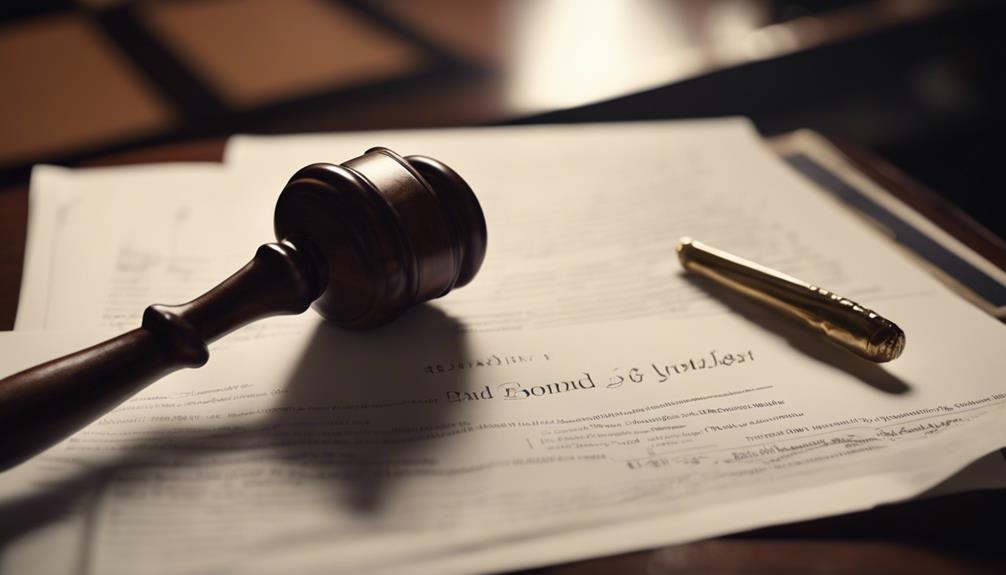**Getting a PR bond means freedom without paying up front.** Criminal history and community connections matter for approval. **Show up in court** or risk re-arrest. Unlike bail, PR bonds rely on trust, not cash. **An attorney can help**, giving support and know-how. **Many think PR bonds cost extra**—they don’t. Understanding this more reveals key legal details.
Key Takeaways
- PR bond allows release pre-trial without upfront payment.
- Decision factors include criminal history, community ties, and court attendance likelihood.
- Conditions involve meeting court obligations and attending hearings.
- Compliance with PR bond terms is legally binding and mandatory.
- Violating a PR bond can lead to re-arrest and legal consequences.
Definition of a PR Bond
We call a PR bond, or Personal Recognizance Bond, a type of bond that allows release from jail pre-trial without the need to post money upfront. This means that a defendant can be set free while awaiting trial, with the promise to appear in court when required. The decision to grant a PR bond is influenced by various factors, including the defendant's criminal history, ties to the community, and the likelihood of showing up for court appearances. However, the severity of the charges and the potential threat to public safety also play a role in the approval process.
Once a PR bond is granted, certain conditions must be met by the defendant. These conditions typically include attending all court appearances as scheduled. Additionally, the court may impose other requirements, such as attending court-ordered classes or meetings. It's important for the defendant to adhere to these conditions to avoid facing further legal consequences. A PR bond offers a way for individuals to be released from jail before trial, but it comes with responsibilities that must be taken seriously.
Eligibility Criteria for PR Bonds

When determining eligibility for a PR bond, factors such as criminal history, employment status, community ties, and the likelihood of appearing in court are taken into consideration. Judges carefully weigh these aspects to assess the risk of releasing an individual on a PR bond. Criminal history plays an important role, with judges considering the severity of past offenses and whether there's a pattern of repeated criminal behavior.
Employment status is also significant, as having stable employment can demonstrate responsibility and a lower flight risk. Community ties, such as family connections and length of residency, can show a defendant's roots in the area and willingness to abide by court orders. Additionally, the likelihood of appearing in court is a significant factor, as judges need assurance that the individual will attend all required hearings.
Process of Obtaining a PR Bond
When applying for a PR bond, one must meet specific application requirements that include providing personal references and attending interviews with a pretrial officer.
Eligibility for a PR bond hinges on factors such as criminal history, employment status, and community ties.
The approval process for a PR bond involves thorough consideration of these criteria before a decision is made.
Application Requirements for PR Bond
The process of securing a PR bond involves providing personal references and undergoing pretrial officer interviews. This step plays a significant role in the PR bond application process, as personal references help assess the individual's character and reliability. Pretrial officer interviews aim to gather information about the individual's background and circumstances. However, court system delays can sometimes lead to extended prison stays while waiting for a PR bond decision. In addition to these requirements, there may be costs associated with obtaining a PR bond, such as fees for court-ordered classes or other obligations. It's worth mentioning that meeting the prerequisites for a PR bond does not guarantee approval; the final decision rests with the judge.
| Application Requirements for PR Bond | |
|---|---|
| Personal References | Assessment of character and reliability |
| Pretrial Officer Interviews | Gather information about background |
| Court System Delays | Possible extended prison stays |
| Costs Associated | Fees for court-ordered classes |
Eligibility Criteria for PR Bond
To determine eligibility for a PR bond, factors such as criminal history, employment status, community ties, and likelihood of court appearance are considered. While meeting the prerequisites is important, approval ultimately rests on the judge's discretion.
The process may involve gathering personal references, attending interviews with a pretrial officer, and potentially experiencing court delays. Additionally, individuals should be prepared for associated costs like court-ordered classes that may need to be covered.
It's essential to comply with the conditions of the PR bond, as failure to do so can lead to re-arrest and the obligation to pay the full bail amount. Understanding these criteria is necessary for a successful PR bond application process.
Approval Process for PR Bond
How does a judge determine if a defendant is eligible for a PR bond?
The approval process for a PR bond involves a thorough judge review of various factors. The defendant's criminal history, employment status, community ties, and likelihood to appear in court are key considerations. Additionally, the severity of charges and public safety concerns play a significant role in the judge's decision.
Meeting the prerequisites for a PR bond, such as having a stable job and strong community connections, doesn't automatically guarantee approval; it ultimately rests on the judge's discretion. Delays in the process may occur due to the necessity of personal references and interviews with pretrial officers.
It's important to adhere to the conditions of the PR bond to avoid re-arrest and full bail payment.
Importance of Compliance With PR Bonds

Adhering to PR bond conditions is vital to prevent re-arrest and guarantee a successful pre-trial release. Compliance with PR bonds involves meeting the specific requirements set forth by the court. These conditions aren't optional; they're legally binding obligations that must be followed. Failure to comply can have severe consequences, including facing additional charges and the revocation of the bond.
One critical aspect of compliance is attending all court appearances as mandated. Missing a court date can lead to the violation of the PR bond terms, resulting in immediate arrest and the need to pay the full bail amount.
Understanding and respecting the PR bond conditions is essential for a smooth pre-trial release process. By following these requirements diligently, individuals can demonstrate their commitment to the court and the legal system. Compliance with PR bonds not only guarantees a successful release but also helps maintain a positive legal standing throughout the pre-trial period.
Benefits of a PR Bond Vs. Traditional Bail

PR bonds offer a cost-effective bail option compared to traditional bail, reducing the financial burden on individuals.
They also provide greater flexibility in meeting obligations like attending court appearances and completing required classes.
Choosing a PR bond can be a practical choice for those seeking a more manageable way to fulfill their legal requirements while awaiting trial.
Cost-Effective Bail Option
Opting for a PR bond over traditional bail can provide a cost-effective solution for securing release without immediate payment. PR bonds emphasize an individual's community ties and stability, making it a favorable choice.
Unlike traditional bail, PR bonds require attending all court appearances, ensuring compliance with legal proceedings. This type of bond is granted based on various factors, including criminal history and ties to the community, which can reduce the financial burden on the individual.
It's essential to meet all requirements set by the PR bond, as failure to do so may lead to re-arrest. Consider the cost-effective benefits of a PR bond when seeking release while maintaining stability and meeting legal obligations.
Lower Financial Burden
Choosing a PR bond instead of traditional bail can greatly alleviate the financial burden on defendants by eliminating the need for upfront payment. PR bonds prioritize trust in the defendant's community ties and their commitment to appear in court over requiring monetary security for release. This shift in focus not only benefits the defendant but also emphasizes the justice system's belief in the individual's reliability. However, it is imperative to understand that failure to comply with the conditions of a PR bond can lead to re-arrest and the potential need to pay the full bail amount. By promoting community ties and trustworthiness, PR bonds offer a pathway to release that eases the financial strain typically associated with securing bail.
| Benefit | Explanation | Example |
|---|---|---|
| Lower Financial Burden | PR bonds do not require upfront payment, reducing financial strain on defendants. | Traditional bail necessitates a set sum for release, unlike PR bonds. |
| Trust in Community Ties | PR bonds demonstrate trust in the defendant's ties to the community and their reliability to appear in court. | Failure to comply may lead to re-arrest and full bail payment. |
| Focus on Trust | PR bonds prioritize community ties and trust over monetary security for release. | Compliance with bond conditions is essential to avoid re-arrest. |
Greater Flexibility in Obligations
Enjoying more important terms compared to traditional bail, individuals granted a PR bond benefit from increased flexibility in meeting their obligations to the court. Unlike traditional bail that often requires upfront payment, a PR bond allows individuals to be released without having to pay a set amount initially.
However, recipients of PR bonds must fulfill certain responsibilities, such as attending all court appearances as mandated. These bonds aren't just about avoiding a financial burden; they also demonstrate trust in an individual's ties to the community, emphasizing the importance of community stability.
It's significant for those with PR bonds to comply with the conditions set forth, as failing to do so can lead to the risk of rearrest and potential consequences.
Factors Considered for PR Bond Approval

When determining approval for a PR bond, key factors such as criminal history, employment status, community ties, and the likelihood of appearing in court are carefully considered. The judge's decision weighs heavily on the severity of charges and the potential threat to public safety. Meeting the prerequisites for a PR bond doesn't automatically guarantee approval; it ultimately depends on the judge's discretion. Costs associated with a PR bond may encompass expenses like court-ordered classes.
Factors such as criminal history and employment status provide insight into an individual's background and stability, influencing the judge's decision. Strong community ties can demonstrate a support system that encourages compliance with the terms of the PR bond. Additionally, the likelihood of appearing in court is essential for ensuring the individual follows through with their legal obligations. These elements collectively contribute to the judge's assessment of whether granting a PR bond is appropriate, considering both the individual's circumstances and public safety concerns.
Consequences of Violating a PR Bond

What're the potential repercussions of violating a PR bond?
Violating a PR bond can have serious consequences. It may lead to re-arrest and the requirement to pay the full bail amount set by the court. Additionally, failing to adhere to the specified conditions of a PR bond can result in legal actions being taken against the individual. These legal consequences could include facing additional criminal charges, which can further complicate the legal situation.
In addition, violating a PR bond can jeopardize future bond eligibility, making it harder to secure pretrial release in subsequent legal proceedings. To avoid such repercussions, it's important to strictly follow all the conditions outlined in the PR bond agreement. By respecting these terms, individuals can maintain their freedom while awaiting trial and avoid any further legal entanglements.
It's essential to understand the gravity of violating a PR bond and the potential ramifications it can have on one's legal standing.
Differences Between PR Bonds and Cash Bonds

PR Bonds differ from cash bonds in that they don't require any immediate payment, unlike cash bonds where the full bail amount must be provided upfront.
While cash bonds involve a financial burden, PR Bonds are based on personal recognizance and an individual's ties to the community.
The eligibility criteria, cost comparison, and issuance process for both types of bonds are important factors to take into account when deciding between them.
Cost Comparison Between Bonds
Comparing the costs between bonds, one can immediately notice the significant financial implications of PR Bonds and cash bonds.
- PR Bonds don't require an upfront payment, unlike cash bonds that demand the full bail amount.
- PR Bonds consider factors such as criminal history and community ties for approval, while cash bonds solely depend on payment.
- PR Bonds symbolize trust in the individual's community connections, contrasting with cash bonds that rely on financial resources.
Understanding these differences is vital for individuals seeking bail options. PR Bonds offer a unique opportunity for those with strong community ties, while cash bonds are more financially restrictive. Compliance with PR Bond conditions is essential, as failure can lead to rearrest, similar to cash bonds where non-compliance may result in forfeiture.
Eligibility Criteria for Bonds
Understanding the distinct eligibility criteria for bonds, especially the differences between PR Bonds and Cash Bonds, is vital for individuals maneuvering the bail system. When considering PR bonds, factors such as criminal history, employment status, community ties, and the likelihood of appearing in court are important.
Unlike cash bonds that demand immediate payment of the full bail amount, PR bonds don't require upfront fees. Judges grant PR bonds after a thorough risk assessment, weighing the individual's circumstances and their impact on the community. PR bonds reflect trust in the individual's ties to the community and their commitment to fulfilling court obligations.
Process for Bond Issuance
Among the key distinctions in the bail system lie the processes for issuing bonds, with notable differences between PR bonds and cash bonds. When considering a PR bond, the issuance process involves a thorough evaluation of an individual's criminal history, employment status, and community ties.
The steps for obtaining a PR bond often include:
- Judges evaluating the severity of charges and the potential threat to public safety before granting a PR bond.
- Setting conditions such as attending court-ordered classes or programs alongside the PR bond.
- Delays in the issuance process due to the need for personal references, pretrial officer interviews, and scheduling within the court system.
Understanding these steps is important for individuals navigating the legal system and seeking release on a PR bond.
Role of Attorneys in PR Bond Proceedings

Legal representation by attorneys is pivotal in securing a PR bond approval due to their ability to highlight positive traits effectively. Attorneys play an essential role in the release process by expediting it and negotiating bond terms to guarantee the best possible outcome for their clients. They possess the knowledge and experience to navigate the intricate court requirements associated with obtaining a PR bond. When it comes to PR bond proceedings, having an experienced criminal defense lawyer on your side can greatly improve your chances of success.
Throughout the PR bond process, attorneys provide invaluable guidance and support, offering reassurance and expertise to their clients. Their role isn't only to represent their clients legally but also to advocate for them emotionally and practically. By enlisting the help of a skilled attorney, individuals can approach the PR bond proceedings with confidence and a higher likelihood of a favorable outcome.
Common Misconceptions About PR Bonds

Frequently misunderstood, PR bonds are often confused with bail bonds due to their distinct characteristics and processes. Here are some common misconceptions about PR bonds:
- PR bonds involve a bail bondsman: Unlike bail bonds that require a bondsman's services and payment, PR bonds are granted directly by judges based on various factors like criminal history and community ties. There's no need to involve a bail bondsman.
- PR bonds come with no conditions: While PR bonds don't require upfront payment like bail bonds, they do have conditions attached. These conditions typically include attending all court appearances as mandated by Texas law.
- PR bonds don't incur additional costs: Although there's no upfront payment for a PR bond, there may be additional costs involved. For instance, court-ordered classes or other requirements may arise, leading to unforeseen expenses that aren't always disclosed upfront.
Frequently Asked Questions
What Is a PR Bond Means?
A PR bond means release from jail before trial without needing to pay money upfront. It's granted based on factors like criminal history and ties to the community.
Approval depends on the charges' severity and public safety concerns. In Texas, a PR bond or reduced bail must be given if the defendant isn't indicted within 90 days.
Conditions include attending all court dates and may involve additional costs like classes.
What Does It Mean to Be Released on Personal Recognizance?
Being released on personal recognizance means securing freedom before trial without posting money. It hinges on factors like criminal history, employment status, and ties to the community. Public safety concerns and the severity of charges impact this decision.
In Texas, the law demands release on personal recognizance or reduced bail if not indicted within 90 days. Noncompliance with PR bond conditions may lead to re-arrest and full bail payment.
Can You Get a PR Bond for a Felony in Texas?
Yes, getting a PR bond for a felony in Texas is possible, though less common than for misdemeanors. Judges weigh factors like charge severity and public safety risk.
Felony PR bonds often come with stricter conditions and more scrutiny. Having strong community ties and a clean criminal record can boost your chances.
Ultimately, judges decide on felony PR bonds.
What Happens if You Violate a PR Bond in Colorado?
If we violate a PR bond in Colorado, consequences can include re-arrest and full bail payment. Failure to follow PR bond conditions may lead to legal trouble and penalties, affecting future bond eligibility and court decisions.
Adhering to all PR bond terms is essential to avoid violations. Seeking legal guidance promptly when facing PR bond issues is highly recommended.
What are the potential consequences of violating a PR bond?
Violating a PR bond can have serious consequences, including facing arrest, having the original bond revoked, and being detained without the option of release. It is crucial to adhere to the conditions set by the court to avoid these potential ramifications. Understanding Subaru dashboard symbols meanings can help avoid car troubles.
Conclusion
In summary, understanding the significance of a PR bond is essential for successfully maneuvering through the legal system. Just as a compass guides a sailor through stormy waters, knowledge of PR bonds can assist individuals in staying on track when facing legal challenges.
By meeting eligibility criteria, following the process, and complying with the terms, one can benefit from the advantages of a PR bond over traditional bail. Stay informed and empowered to make the best decisions for your legal situation.










